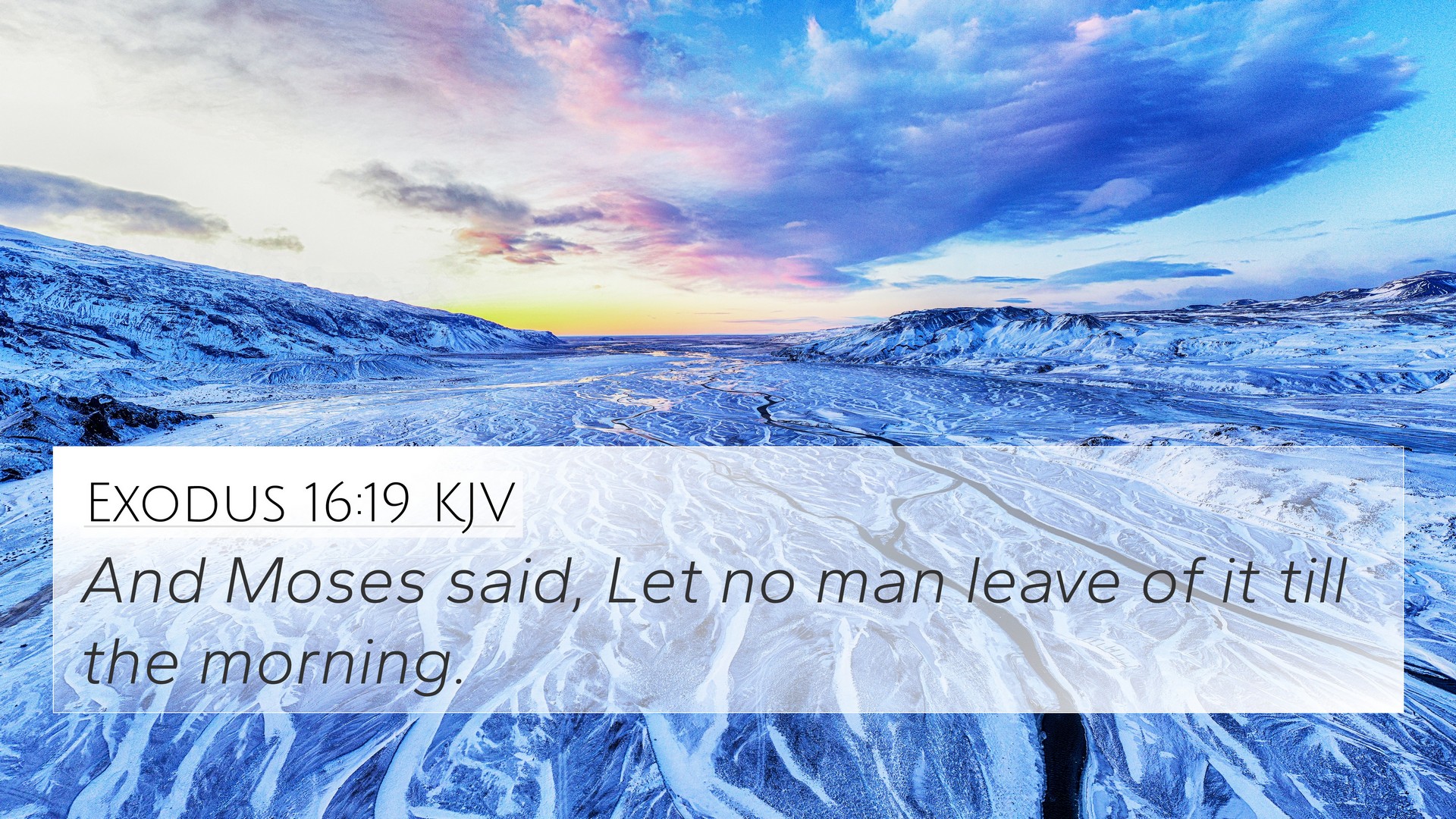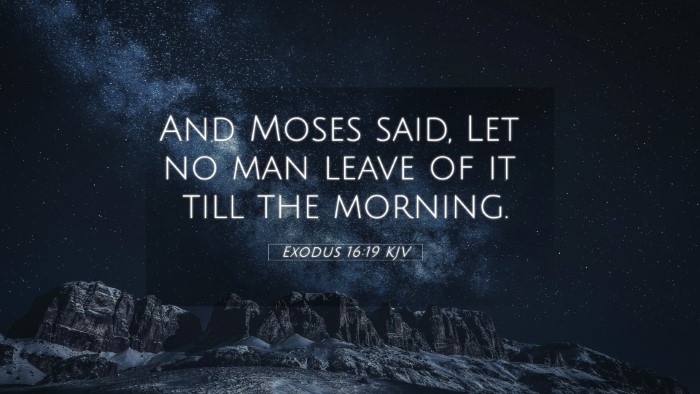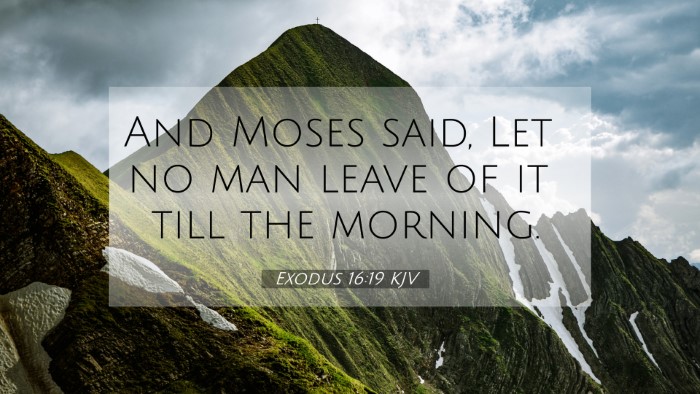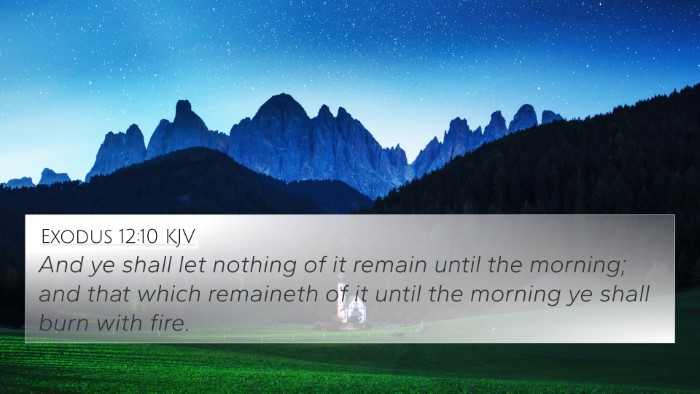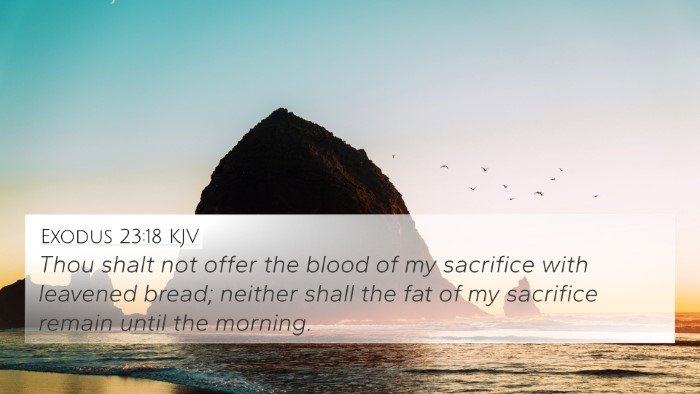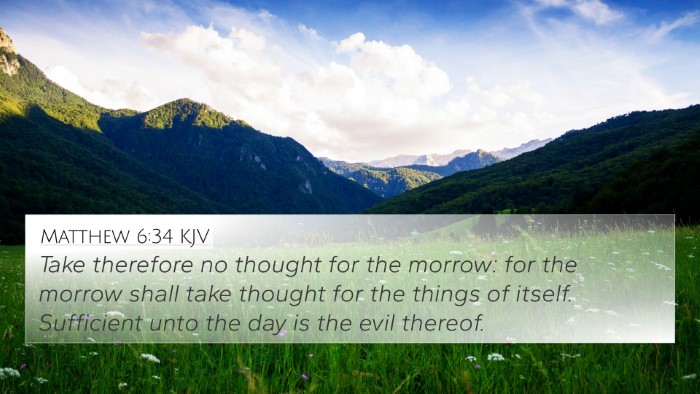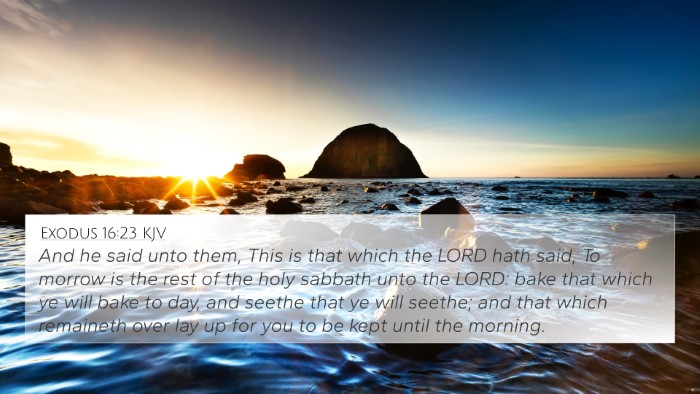Understanding Exodus 16:19
Exodus 16:19 states: "And Moses said, Let no man leave of it till the morning." This verse occurs in the context of God providing manna to the Israelites in the wilderness, emphasizing trust in God's provision and the importance of obedience.
Commentary Insights
-
Matthew Henry:
Henry emphasizes the significance of obedience to God's instructions. The Israelites were to gather only what they needed for the day, illustrating God's desire for them to trust in His daily provision rather than hoard for future needs, which reflects a lack of faith.
-
Albert Barnes:
Barnes notes that Moses' instruction was crucial because the manner of gathering manna was uniquely designed to teach the Israelites reliance on God. Retaining the manna overnight would lead to spoilage, symbolizing the futility of trying to secure future provisions without faith in the present.
-
Adam Clarke:
Clarke elaborates on the spiritual implications of this verse. He posits that the act of leaving manna until morning could be viewed as an act of rebellion against God's command. The daily provision of manna was intended to create a rhythm of dependency on God that strengthened their faith.
Thematic Connections
This verse serves as a pivotal lesson in the Bible regarding trust and reliance on God. It can be linked to several other scriptures that highlight similar themes of dependence on divine provision and the necessity of obedience:
- Manna and Provision: John 6:31-33 - Jesus refers to the manna from heaven when discussing His identity as the true bread from heaven, linking physical sustenance to spiritual nourishment.
- Daily Dependence: Matthew 6:11 - "Give us this day our daily bread" mirrors the essence of trusting God for daily needs.
- Faith and Obedience: Philippians 4:19 - "And my God shall supply all your needs" emphasizes God's commitment to provide for His people as they trust Him.
- Lessons from Israel: Deuteronomy 8:3 - This passage recalls how God humbled Israel to teach them that man does not live by bread alone, reinforcing the lesson of reliance on God.
- Spiritual Food: 1 Corinthians 10:3-4 - Paul highlights the spiritual significance of the Israelites’ experiences with manna as symbolic of Christ.
- Obedience in Faith: James 1:22 - "But be doers of the word, and not hearers only," reflects the necessity of obedience to God, similar to the commandments regarding manna.
- The Perils of Hoarding: Luke 12:16-21 - The Parable of the Rich Fool warns against storing up earthly treasures and forgetting about the need for daily reliance on God.
Application of Exodus 16:19
Exodus 16:19 invites believers to reflect on their own lives regarding trust and obedience. Here are some practical points derived from this verse:
- Daily Trust: Make a habit of trusting God for your daily needs rather than worrying about the future.
- Spiritual Discipline: Develop routines in prayer and scripture reading that reinforce your dependency on God's Word as your daily nourishment.
- Giving and Generosity: Cultivate a spirit of generosity instead of hoarding resources, understanding that God provides sufficiently for you and for others in your community.
- Obedience to God's Word: Prioritize obedience in your faith journey, recognizing that God's commands are designed for your good.
Conclusion
Ultimately, Exodus 16:19 serves as a powerful reminder of God's provision and the faith He expects from His followers. By heeding the lessons illustrated in this verse and its related scriptures, believers can foster a deeper relationship with God through trust and obedience.
Exploring Bible Cross-references
For those interested in studying Bible verses that connect to Exodus 16:19, several tools and methods can assist:
- Bible Concordance: Use a concordance to find related passages that discuss God’s provision.
- Cross-reference Bible Study: Engage in studies that highlight interconnections between the Old and New Testament.
- Identifying Thematic Connections: Explore themes of reliance and obedience across different books of the Bible.
- Bible Reference Resources: Utilize available resources that outline the relationship between various verses.
- Comprehensive Cross-reference Materials: Refer to materials that offer a detailed analysis of scripture interrelations.
